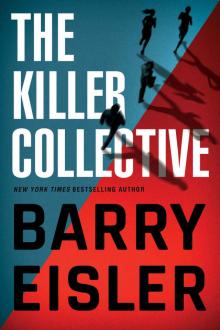- Home
- Barry Eisler
The Night Trade (A Livia Lone Novel Book 2)
The Night Trade (A Livia Lone Novel Book 2) Read online
PRAISE FOR LIVIA LONE
AN AMAZON BEST BOOK OF 2016
A KIRKUS REVIEWS BEST FICTION OF 2016 SELECTION
AN AMAZON BEST BOOK OF THE MONTH: MYSTERY, THRILLER, & SUSPENSE CATEGORY
“An absolutely first-rate thriller . . . Emotionally true at each beat.”
—New York Times Book Review
“An explosive thriller that plunges into the sewer of human smuggling . . . Filled with raw power, [Livia Lone] may be the darkest thriller of the year.”
—Kirkus Reviews, starred review
“[An] exciting thriller . . . Eisler keeps a firm hand on the throttle of what could be the first of a rewarding series.”
—Publishers Weekly
“Livia is a complex and sympathetic character . . . Readers of hard-boiled fiction, heavily tinted toward noir, may see in Livia something of Carol O’Connell’s Kathy Mallory, also a cop with an abuse-filled past and an appetite for revenge.”
—Booklist
“Readers may be reminded of Stieg Larsson’s beloved Lisbeth Salander when they meet Livia Lone, and will be totally riveted by the story of this woman on a mission to right the wrongs in her past.”
—Bookish
“Eisler offers up an astonishingly raw tale that is dark and disturbing, but one that you will want to finish. Both the compelling narrative and the fascinating—yet seriously flawed—heroine are indications that Eisler is at the top of his game.”
—RT Book Reviews
“Barry Eisler is back, and then some. [Livia Lone] may be the best and strongest work of his storied career . . . Livia Lone moves like a freight train . . . Jump on what appears to be the start of a terrific new series.”
—Bookreporter
“This electric thriller . . . keeps you riveted to the end.”
—Authorlink
“A literary home run in every respect . . . Livia Lone [reaches] a whole new level . . .”
—Providence Journal
“Former CIA agent Barry Eisler’s latest sexy cyber thriller follows Seattle PD sex-crimes detective Livia Lone, who knows the monsters she hunts . . . The story is riveting.”
—Boing Boing
“You won’t be able to tear yourself away as the story accelerates into a Tarantino-worthy climax and when you’re left gasping in the wake of its gut-wrenching vigilante justice, you’ll belatedly realize you learned a lot about a social travesty that gets far too little attention . . . Livia Lone is a harrowing tale with a conscience.”
—Chicago Review of Books
“Everything you could want in a great thriller—a badass main character, an emotional and suspenseful plot, lots of high stakes, gritty murders and well-written action scenes.”
—Night Owl Reviews
ALSO BY BARRY EISLER
A Clean Kill in Tokyo (previously published as Rain Fall )
A Lonely Resurrection (previously published as Hard Rain)
Winner Take All (previously published as Rain Storm)
Redemption Games (previously published as Killing Rain)
Extremis (previously published as The Last Assassin)
The Killer Ascendant (previously published as Requiem for an Assassin)
Fault Line
Inside Out
The Detachment
Graveyard of Memories
The God’s Eye View
Livia Lone
Zero Sum
SHORT WORKS
“The Lost Coast”
“Paris Is a Bitch”
“The Khmer Kill”
“London Twist”
ESSAYS
“The Ass Is a Poor Receptacle for the Head: Why Democrats Suck at Communication, and How They Could Improve”
“Be the Monkey: A Conversation about the New World of Publishing” (with J. A. Konrath)
This is a work of fiction. Names, characters, organizations, places, events, and incidents are either products of the author’s imagination or are used fictitiously. Any resemblance to actual persons, living or dead, or actual events is purely coincidental.
Text copyright © 2018 by Barry Eisler
All rights reserved.
No part of this book may be reproduced, or stored in a retrieval system, or transmitted in any form or by any means, electronic, mechanical, photocopying, recording, or otherwise, without express written permission of the publisher.
Published by Thomas & Mercer, Seattle
www.apub.com
Amazon, the Amazon logo, and Thomas & Mercer are trademarks of Amazon.com, Inc., or its affiliates.
ISBN-13: 9781477820049 (hardcover)
ISBN-10: 1477820043 (hardcover)
ISBN-13: 9781477820032 (paperback)
ISBN-10: 1477820035 (paperback)
Cover design by Rex Bonomelli
First edition
For the memory of Major Douglas C. Patt (US Army, Retired), son of Arthur and Helen, father of Kara, Michael, and Gavin, loving partner of Vivian, who enjoyed these books and made them so much better.
CONTENTS
1
2
3
4
5
6
7
8
9
10
11
12
13
14
15
16
17
18
19
20
21
22
23
24
25
26
27
28
29
30
31
32
33
34
AUTHOR’S NOTE
NOTES
ACKNOWLEDGMENTS
ABOUT THE AUTHOR
1
Livia was warming up on the mats at Seattle Police Headquarters when her lieutenant, Donna Strangeland, came through the swinging doors at the far end of the gym. Alongside Strangeland was a big man in a gray suit, the jacket cut loosely—enough to conceal, say, a holster and a good-sized pistol. A visitor’s badge was clipped to one of the man’s lapels, but he strode in as confidently as though he owned the building. Fed, Livia thought. For one bad second, she flashed on what she had done to the senator and his men in that Bangkok hotel room.
But no, she was just being paranoid. If this had been about the senator, she’d be getting a visit from a platoon of FBI agents and the chief, not a single fed and the lieutenant. Besides, there was another possibility: a few weeks earlier, Strangeland had mentioned something about a Homeland Security joint anti-trafficking task force. Maybe that was what this was about.
Strangeland and the visitor walked past the group of men lifting weights in one corner and the two-on-two basketball game in the other, then stopped in the center of the cavernous space. Livia could see them conferring, but over the clank of the weightlifters’ barbells and the squeak of the basketball players’ sneakers and the reverberating dribble of their ball, she couldn’t hear any of the conversation. Then Strangeland caught Livia’s eye and motioned for her to come over. Whatever this guy was here for, it seemed they weren’t supposed to discuss it in front of the class Livia was teaching.
Livia nodded an acknowledgment, then glanced at the six women cops limbering up around her. “Start from the guard,” she said. “You know the drill. Protect the weapon and control the distance. Escape and create more distance. Draw and three-sixty. I’ll be back in a minute.”
She walked over to Strangeland and the man. He was black and completely bald, with a big pair of eyeglasses in green plastic frames. Mid-fo
rties, maybe six-two and 220. She wondered if he’d played football in his younger days—he had the build for it, though it looked as though what had once been just muscle was now covered with a layer of fat. Maybe more time at a desk than in the field. He smiled as Livia approached—an exceptionally sunny smile she sensed he used to lull people.
“Sorry to interrupt,” Strangeland said in her trademark Brooklyn-transplant accent, raising her voice over the sounds of the bouncing basketball and the music the weightlifters were playing. “Livia, this is Special Agent Little. Homeland Security Investigations.”
Livia looked at him but said nothing. If he was expecting her to go first, he’d be waiting a long time. She’d known even before becoming a cop that people gave away a lot more talking than they did listening.
Little’s smile broadened, maybe in recognition of Livia’s composure. “Livia Lone,” he said, conceding. He held out his hand. “I’ve been looking forward to meeting you.”
They shook. He had big hands and a good grip, but he neither overdid nor underdid it the way some men would to demonstrate superior strength, or their views on equality, or whatever. She noticed that by saying her full name, he avoided having to choose between “Officer Lone,” which might have seemed too deferential, and “Livia,” which might have seemed too familiar. And maybe he was trying to build rapport, too, because a good interrogator knows there are no more beautiful words in the world than someone’s own name. She’d read somewhere that if you walked up and said a person’s full name three times, that person couldn’t help but smile.
“What do I call you?” she asked, wanting to see how he would play that end of the introduction.
“Well, the full name is Benjamin Dixon Little, but most people call me B. D.”
“B. D., then.” She considered making a joke about a man of his size being named Little, but decided he’d probably been hearing cracks like that since he was a teenager.
Strangeland glanced at Little, then back to Livia. “Special Agent Little is here to talk to you about that joint task force I mentioned. I would have given you a heads-up, but I didn’t get one myself.”
Livia caught the deliberate rebuke, and so, apparently, did Little, because he said, “Apologies for that. Things are coming along a little faster than I’d expected.”
It wasn’t much of an explanation for a no-knock visit. Livia was familiar with the practice of dropping by for an interview without giving the person of interest a chance to prepare, and she didn’t much appreciate being on the other end of it.
“I hope you won’t mind,” she said, “but for the next hour I have a class to teach. You’re welcome to stick around and watch if you want. Or”—she glanced at Lieutenant Strangeland, suddenly inspired—“in fact, why don’t you roll around with us? We usually have one of the big SWAT guys act as uke, but today it’s just us girls. We could use your help.”
Lieutenant Strangeland smiled ever so slightly. She knew Livia was messing with Little, and obviously didn’t object. Maybe she’d even brought him down here with this outcome in mind.
Little glanced over at Livia’s students, who were now drilling from the guard as she had instructed them—defenders on their backs, legs wrapped around their partners, protecting bright-green plastic training pistols while attacking the eyes, clearing the legs, scrambling free. The gym echoed with shouts of “Do not move!” as successive trainees escaped, cleared leather, gained distance, and pointed their weapons at their attackers, all the while doing a tactical visual sweep for danger at the periphery.
“This is a, what, a women’s self-defense class?” Little asked, trying to buy time.
“Defensive tactics against a bigger, heavier attacker,” Livia said. “What works on the street for someone like you isn’t generally suitable for a small woman.”
For an instant, Livia thought she saw something pass across Little’s face. Wistfulness? Sadness? Disdain?
“You don’t approve?” Livia said.
Whatever had opened up in Little’s expression was suddenly gone. “I approve very much,” he said.
“Livia’s got a grappling background,” Strangeland said.
Little chuckled. “Is that what you call Idaho state wrestling champion in high school and judo Olympic alternate in college?”
So Little had done his homework. And wanted them to know it, too.
“Have you had any training?” Livia said.
Little shook his head. “Not much.”
She knew he was lying. Not much meant either none, or a lot. Probably the latter.
“Well?” Livia said.
Little glanced over at the basketball game. “I think that game over there would be safer.”
Livia smiled. “But not nearly as much fun.”
“Ha. Well, I’d plead the absence of a gi. But I expect you’d just offer to lend me one. And besides, I see you’re all wearing street clothes.”
Livia shrugged. “We try to keep it realistic.”
There was a pause. Then Little laughed and loosened his tie. “All right,” he said. “I guess I can’t refuse. The honor of Homeland Security seems to be at stake.”
“I’d like to stay,” Strangeland said, “but I’ve got things to do.” She nodded at Livia. The nod said, I want to know what this is all about. Livia returned the nod, and Strangeland turned and left.
Livia and Little walked over to the mats. “Good news,” Livia said. The women disengaged and paused, watching them. “This is Special Agent B. D. Little, from Homeland Security Investigations. And he’s volunteered to be our uke today.”
Little gave the assembled women the sunny smile. “Well, volunteered might be a strong word, but yes, I’m happy to help if I can.”
“Weapons against that wall,” Livia said, pointing.
Little walked to the wall and did as she said, pulling off his jacket, setting it down, and then removing his belt, holstered gun, and spare mags. He set the gun belt down on top of the jacket, then took off his tie and glasses and added them, as well.
“Knife?” Livia called out to him, because it wasn’t uncommon for cops to conceive of their firearms as weapons and their knives as tools. He shook his head. Not a street operator, she thought, confirming her initial impression. Desk jockey. Little added his wallet, keys, and watch to the pile by the wall, then walked back onto the mat.
“Okay,” Little said, stopping a few feet from Livia. “I’m disarmed. How can I be of service?”
His overall friendliness seemed in line with his smile—something Livia sensed he would use to get people to underestimate him. She cautioned herself not to make that mistake.
“One problem we’ve seen again and again,” Livia said, “is the blitz by a big attacker against a smaller cop—the kind that happens so suddenly the cop doesn’t have time to get off line or access a weapon, and winds up falling to the ground or getting slammed into a wall, at which point the attacker presses his advantage. What we’re doing is creating a kind of tactical pause within which—”
Without a word, Little lunged at her like a defensive lineman intent on sacking the quarterback. Somewhere far back in her mind, a voice was shouting, This is exactly what he was setting you up for, what you should have expected . . .
But the voice barely registered. Her body took over: dropping low as he plowed into her, her left leg coming up around his waist, her right heel planted in his crotch, her arms disrupting his grab and taking hold of his lapels as the two of them crashed to the mat. The impact was hard but was distributed all over her body—whereas Little absorbed it mostly through the foot jammed into his testicles. He grunted in pain but kept his weight on her, and she shifted her foot, kicked his leg back, and shot her leg up and around his neck in a triangle choke. She was right about the training, though, because he reacted immediately, planting a foot alongside her butt, dragging her closer, and bracing to come to his feet. Standing and then slamming was a common tactic for a larger, stronger opponent to employ when caught in the gua
rd, and before he could manage it she released the choke, pivoted on her back, hooked one of his heels in a cupped palm, and kicked him onto his ass, using his backward momentum to pull herself forward and into a squat.
The tactical move at that point would have been to scoot back, create distance, and draw the practice pistol. But Little had been trying to make a point, and she was damn sure going to make one in return. So rather than scuttle away, she hopped forward and planted the sole of her right foot against the side of his face, rotating his head away and shoving it into the mat. He tried to roll with the pressure—exactly what she was looking for. She snared his left elbow, grabbed his wrist with her free hand, and dropped back to the mat, popping her hips up and straightening his arm to the limit. Little howled and tried to turn in to her, but between the foot planted against his face and the opposite leg across his chest, he was out of options. She cranked the arm bar harder.
“Okay, okay, uncle!” Little cried out, his voice distorted by the foot against his face.
Livia kept the arm extended, a millimeter from hyperextension. “You sure?” she said. “You don’t want to keep going?”
“No, no, no, you’ve made your point.”
“You going to be a good dance partner? Or are you going to try to trip me up again?”
“Hey, how stupid do you think I am? You win. I’ll be good.”
Livia released the arm and rolled away from him. She glanced around—the 360 perimeter check, a conditioned reflex. The women were all smiling. One of them, a senior sex-crimes detective named Suzanne Moore, called out, “That’s what I’m talking about!” and started clapping. The other women followed suit.
Little sat up slowly, doubled forward from the pain of the ball shot and breathing heavily. He rubbed his elbow and nodded at the applause as though to say, Yeah, okay, I deserved that.
Livia held up a hand to the class, appreciative but also embarrassed. “Okay,” she said. “Let’s focus. What did I do wrong?”
“Not break his arm?” Moore offered. The rest of the women laughed.
Livia smiled. Moore was a good cop and one of the women who had taken Livia under their wings when Livia was a rookie.
“Seriously,” Livia said. “What are our tactical goals?”

 All the Devils
All the Devils Requiem for an Assassin
Requiem for an Assassin The Killer Collective
The Killer Collective The Chaos Kind
The Chaos Kind The God's Eye View
The God's Eye View Paris is a Bitch
Paris is a Bitch The Khmer Kill: A Dox Short Story (Kindle Single)
The Khmer Kill: A Dox Short Story (Kindle Single) The Last Assassin
The Last Assassin The Detachment
The Detachment The Night Trade (A Livia Lone Novel Book 2)
The Night Trade (A Livia Lone Novel Book 2) Fault Line
Fault Line Hard Rain
Hard Rain The Khmer Kill_A Dox Short Story
The Khmer Kill_A Dox Short Story London Twist: A Delilah Novella
London Twist: A Delilah Novella The Lost Coast
The Lost Coast Rain Fall
Rain Fall Zero Sum
Zero Sum Killing Rain
Killing Rain John Rain 08: Graveyard of Memories
John Rain 08: Graveyard of Memories A Clean Kill in Tokyo (previously published as Rain Fall)
A Clean Kill in Tokyo (previously published as Rain Fall) Inside Out: A novel
Inside Out: A novel John Rain 07 - The Detachment
John Rain 07 - The Detachment Graveyard of Memories
Graveyard of Memories The Lost Coast -- A Larison Short Story
The Lost Coast -- A Larison Short Story Zero Sum (A John Rain Novel)
Zero Sum (A John Rain Novel)